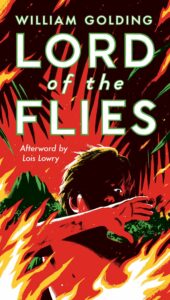
Book Summary
Lord of the Flies is an exciting adventure book written by William Golding. It tells the story of a group of boys who get stranded on a deserted island after their plane crashes. They have to figure out how to survive and get rescued.
I really enjoyed reading Lord of the Flies because it was full of suspense and surprises. The author did a great job of describing the island and the characters, so I could imagine everything in my mind. The story is exciting and sometimes scary, but it also teaches us important lessons about friendship, leadership, and the importance of rules.
Lord of the Flies is a book that shows how people can change when they are put in difficult situations. The boys on the island start off by trying to work together and make rules, but as time goes on, they become more wild and start fighting each other. It makes us think about how important it is to have rules and to treat each other with kindness and respect.
William Golding was a British writer who lived from 1911 to 1993. He wrote many books, but Lord of the Flies is one of his most famous ones. Golding won the Nobel Prize in Literature in 1983 for his amazing storytelling skills. He wanted to show how people can behave when they are isolated from society, and he did a fantastic job in this book.
“Lord of the Flies” is a novel written by Nobel Prize-winning author William Golding in 1954. The story is set against the backdrop of an unspecified war, where a plane carrying a group of British schoolboys crashes on an uninhabited island. With no adult survivors, the boys are left to govern themselves, resulting in a descent into savagery.
“Lord of the Flies” is a compelling and thought-provoking novel that explores the inherent evil in human nature. The narrative is gripping, with a plot that is both horrifying and fascinating. The characters are well-developed, each representing different aspects of humanity and society. The novel’s setting, a deserted island, serves as a perfect backdrop for the boys’ descent into savagery. The story is a chilling reminder of the thin veneer of civilization that separates humanity from barbarism.
The novel’s strength lies in its exploration of the dark side of human nature. Golding uses the boys’ struggle for survival on the island as a metaphor for the broader conflict within society. The boys’ transformation from civilized, well-mannered children into savage hunters is both shocking and disturbing, forcing readers to confront the potential for evil within all of us.
“Lord of the Flies” is a complex novel with many layers of meaning. On one level, it is a thrilling adventure story. On another, it is a psychological study of the human condition. The novel explores themes such as the struggle between civilization and savagery, the loss of innocence, and the inherent evil in human nature.
The title of the novel, “Lord of the Flies”, is a literal translation of Beelzebub, a name often associated with the devil. This is a clear indication of the novel’s exploration of the theme of inherent evil. The ‘beast’ that the boys fear is not an external monster, but the darkness within themselves.
The characters in the novel represent different aspects of society. Ralph, the elected leader, represents order and civilization. Jack, the antagonist, represents savagery and the desire for power. Piggy, the intellectual, represents the voice of reason. The conflict between Ralph and Jack symbolizes the struggle between civilization and savagery.
William Golding was an English novelist, playwright, and poet. He was born in Cornwall, England, in 1911. Golding served in the Royal Navy during World War II, an experience that influenced his views on humanity and the themes of his writing.
Golding’s first novel, “Lord of the Flies”, was initially rejected by many publishers, but it eventually became a best-seller and is now considered a classic of English literature. The novel’s exploration of the dark side of human nature and the thin veneer of civilization that separates us from savagery has made it a perennial favorite in high school and college literature classes.
Golding was awarded the Nobel Prize in Literature in 1983. He continued to write until his death in 1993. His body of work includes novels, plays, and essays, but “Lord of the Flies” remains his most famous and influential work.
Don Quixote by Miguel de Cervantes
Miguel de Cervantes
Read Now →